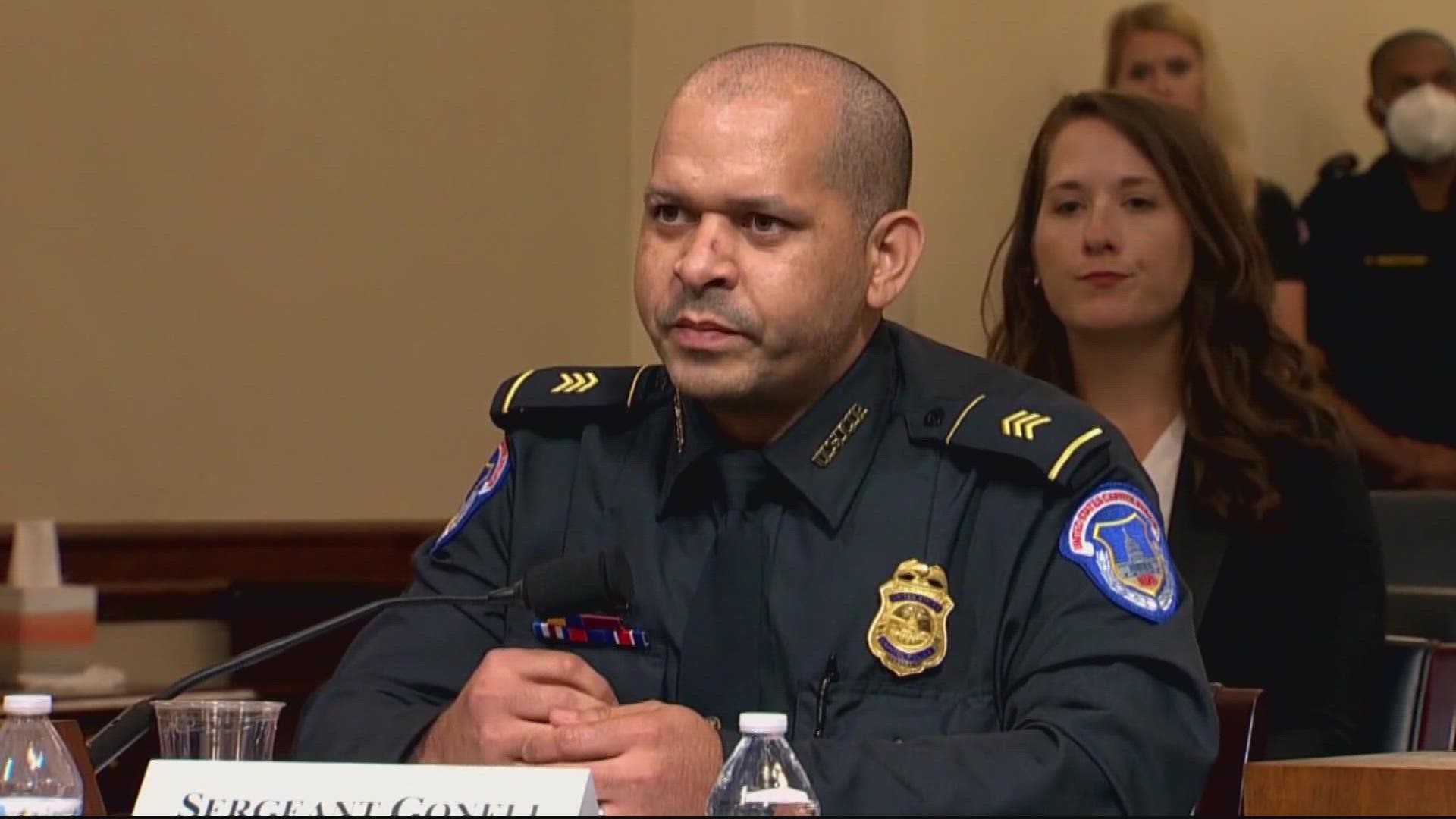WASHINGTON — The government closed its case Friday against a Maine man indicted on 11 counts for allegedly assaulting police on Jan. 6, but he could have to wait until Labor Day to learn a judge’s verdict.
Kyle Fitzsimons, of Lebanon, Maine, sat impassively this week as federal prosecutors called three police officers to the stand to testify they had been assaulted by Fitzsimons while defending the Lower West Terrace Tunnel at the U.S. Capitol Building. Surveillance and body camera video admitted as evidence appears to show Fitzsimons throwing an unstrung bow – which struck a DC Police officer in the head – before repeatedly engaging with officers on the front line. In his closing arguments Friday, assistant U.S. attorney Michael Gordon said Fitzsimons was “indiscriminately wailing” on officers on the front line.
“His resolution, his preparation, his fury is crystal clear,” Gordon said.
After the alleged assaults, publicly available video submitted in the case appears to show Fitzsimons walking back through the crowd and, in response to a woman who described him as an American hero, loudly announcing his name. Gordon said that, among other evidence, showed Fitzsimons was proud of the mob actions and his own role in them.
“He wanted the world to know his name,” Gordon said. “Well, now we do.”
One of the officers Fitzsimons is accused of assaulting is U.S. Capitol Police Sgt. Aquilino Gonell, who testified it was Fitzsimons who grabbed the strap of his riot shield and attempted to drag him to the ground and into the mob. Gonell said as he did so, he felt a “shooting pain” and suffered an injury to his shoulder that required surgery and which, ultimately, is one of the primary reasons behind his impending medical retirement from the force.
Fitzsimons’ attorney, federal public defender Natasha Taylor-Smith, dedicated more time to cross-examination of Gonell’s testimony than any other part of the government’s case. She suggested during the trial that Gonell had received his injury during an assault from another rioter – Mark Ponder—and that he was exaggerating on the stand the pain he felt that day. She also accused Gonell, who has testified before the January 6th Committee and agreed to dozens of interviews – including at least two for which he was compensated – of seeking financial gain by telling his story.
“He really believes that his position as a police officer gives him status,” Taylor-Smith said Friday. He wants to be revered.”
Gonell, a native of the Dominican Republic who came to the U.S. as a child and saw combat in Iraq while serving in the U.S. Army, said in an interview Taylor-Smith played during her closing argument that he joined the Capitol Police force out of a desire to continue serving his adoptive country and to honor his family.
“It was something my family members in the United States and in the Dominican Republic would be proud of me doing,” he said.
Taylor-Smith also suggested during her closing arguments at that at least one of Fitzsimons alleged assaults – throwing the unstrung bow that struck DC Police Officer Sarah Beaver – was an effort to defend another person inside the tunnel. Taylor-Smith did not present any testimony to support that assertion, nor did Fitzsimons’ speak on his own behalf, and Gordon noted during his rebuttal Friday that Fitzsimons would have had to see through at least four officers and a large, scuffed riot shield to have seen the woman. Although her name was not used during the trial, the woman has been identified in other court filings as Victoria White, of Rochester, Minnesota. She’s currently under indictment on four counts stemming from her own alleged role in the riot, including a felony count of civil disorder.
On rebuttal, Gordon said there was no record of Fitzsimons mentioning his intention to try to assist another person in the tunnel in a phone call he made to a town selectmen meeting or an interview with a Maine newspaper because it was a defense formulated after the fact.
“It was invented 16 months later after poring over video in slow motion in preparation for this trial,” he said.
Gordon ended his closing arguments Friday by pushing back on Fitzsimons’ notion that he was a peaceful protester simply seeking a constitutionally protected redress of grievances on Jan. 6.
“We have words in our language for people who use violence for political ends,” Gordon said. “In some we call them fanatics, extremists. In others, we call them guerillas or insurrectionists. And some might call them terrorists. But we never call them patriots.”
U.S. District Judge Rudolph Contreras, who presided over the case, ordered both the government and Taylor-Smith to brief him on their positions on the defense of a third party argument by next Friday, along with a separate briefing relating to the authentication of open source videos submitted by the government. Contreras said he intended to issue a ruling on the case by Labor Day after reviewing those briefings. While awaiting his verdict, Fitzsimons will remain in pretrial detention
If convicted of the most serious counts against him – obstruction of an official proceeding and assaulting police with a dangerous weapon – Fitzsimons could face years in prison. Guy Reffitt, a Texas Three Percenter who was convicted in March of five felony counts that did not include charges of assault, was sentenced earlier this month to more than seven years in prison. Ponder, the D.C. man who pleaded guilty in April to assaulting Gonell and other officers with a metal pole, was ordered last month to serve more than five years in prison.
We're tracking all of the arrests, charges and investigations into the January 6 assault on the Capitol. Sign up for our Capitol Breach Newsletter here so that you never miss an update.

